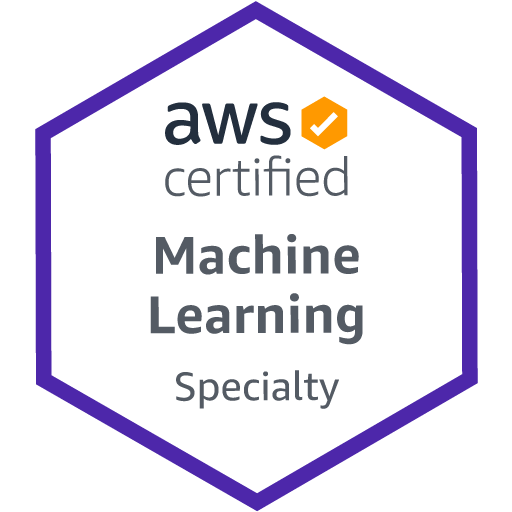AWS Certified Machine Learning Machine Learning Specialty
- Description
- Curriculum
- Reviews

AWS Certified Machine Learning Specialty Practice Exam
Description
AWS Certified Machine Learning Specialty Practice Exam
Format – Practice Exam
No. of Questions – 262 Questions
MCQ and Answers with Explanations
AWS Certified Machine Learning – Specialty
About AWS Certified Machine Learning – Specialty Practice Exam
AWS Certified Machine Learning – Specialty certification exam is intended for individuals who perform a development or data science role. It validates a candidate’s ability to design, implement, deploy, and maintain machine learning (ML) solutions for given business problems.
Skills Validated by the Certification
- Select and justify the appropriate ML approach for a given business problem
- Identify appropriate AWS services to implement ML solutions
- Design and implement scalable, cost-optimized, reliable, and secure ML solutions
Recommended AWS Knowledge
Successful candidate likely has one to two years of hands-on experience developing, architecting, or running ML/deep learning workloads on the AWS Cloud, along with
- Ability to express the intuition behind basic ML algorithms
- Experience performing basic hyperparameter optimization
- Experience with ML and deep learning frameworks
- Ability to follow model-training best practices
- Ability to follow deployment and operational best practices
Course outline for AWS Certified Machine Learning – Specialty Practice Exam
Domain 1: Data Engineering
1.1 Create data repositories for machine learning.
1.2 Identify and implement a data-ingestion solution.
1.3 Identify and implement a data-transformation solution.
Domain 2: Exploratory Data Analysis
2.1 Sanitize and prepare data for modeling.
2.2 Perform feature engineering.
2.3 Analyze and visualize data for machine learning.
Domain 3: Modeling
3.1 Frame business problems as machine learning problems.
3.2 Select the appropriate model(s) for a given machine learning problem.
3.3 Train machine learning models.
3.4 Perform hyperparameter optimization.
3.5 Evaluate machine learning models.
Domain 4: Machine Learning Implementation and Operations
4.1 Build machine learning solutions for performance, availability, scalability, resiliency, and fault tolerance.
4.2 Recommend and implement the appropriate machine learning services and features for a given problem.
4.3 Apply basic AWS security practices to machine learning solutions.
4.4 Deploy and operationalize machine learning solutions.
Domain 5: Database Security
5.1 Encrypt data at rest and in transit
5.2 Evaluate auditing solutions
5.3 Determine access control and authentication mechanisms
5.4 Recognize potential security vulnerabilities within database solutions





